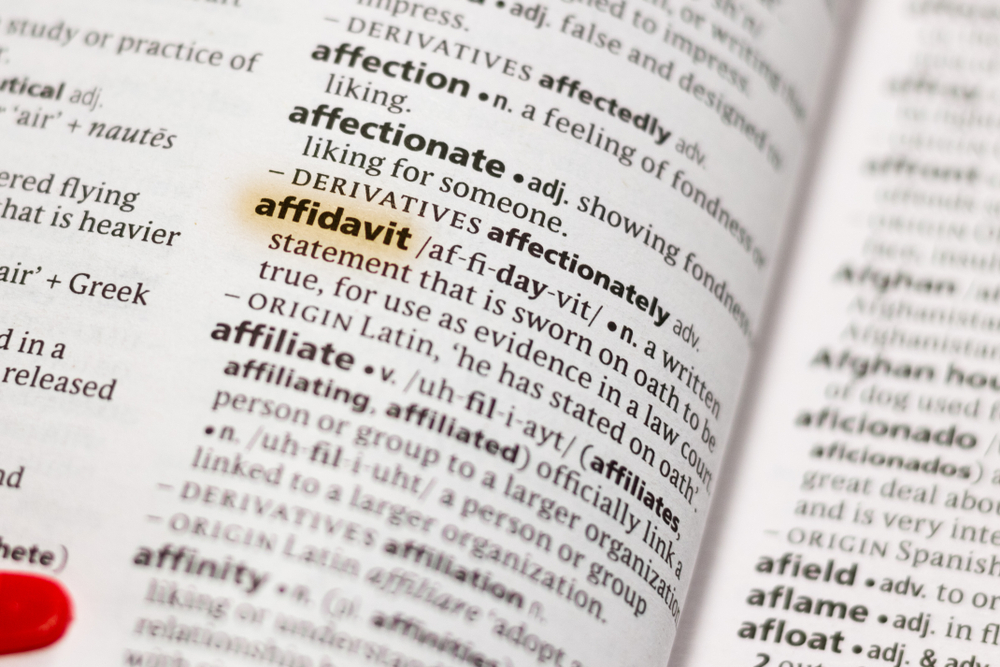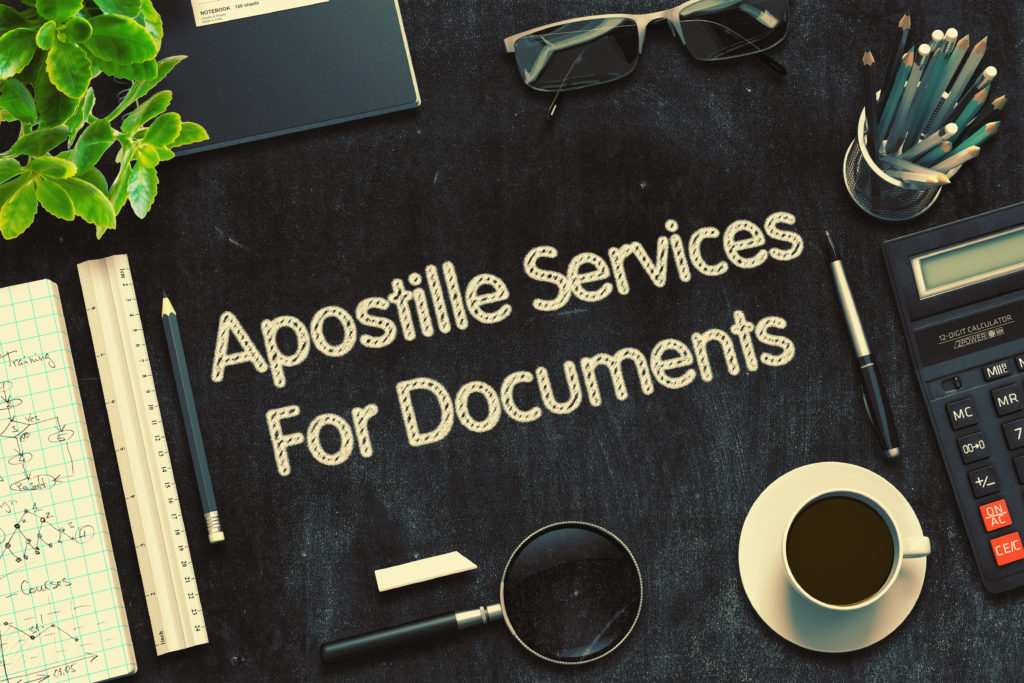At some point or another in your life, you are going to encounter an affidavit. When that time comes, you are going to have some questions. What is an affidavit? Should I sign one? How do I get an affidavit notarized? Fear not, in this article, we are going to answer all of these questions and more. Buckle up and get ready to learn everything you need to know about the mysteries of the affidavit.
What is an Affidavit?
Affidavits can take many forms. An affidavit is a legal document that includes a written statement in which the signer swears the contents are true. Signing an affidavit is a great responsibility and should not be taken lightly. Lying or knowingly omitting information from an affidavit is perjury.
Think of an affidavit as the written form of an oath. We have all seen an oath taken, either on television or in the real world. In legal TV dramas, you may have seen a witness raise their right hand when they take the stand. They will then agree to a statement along the lines of “I swear to tell the truth, the whole truth, and nothing but the truth”. This physical and verbal ceremonial dance is intended to heighten the importance of the promise being made.
Finally, an affidavit must be notarized in order to be considered legal and binding. We will discuss notaries and notarization in more depth later in this article.
What is Perjury?
Simply put, perjury is the criminal act of lying under oath. Perjury can be committed both verbally, or in written form. It is important to understand that the scope of perjury spans wider than simply lying or falsifying information. In fact, one can commit perjury by knowingly omitting information from their testimony under oath.
While signing an affidavit does not come with a ceremonial oath promised before a higher power, the gravity of your signature carries the same resonance.
Affidavit Examples
As previously mentioned, an affidavit is not a catch-all document. Affidavits are used for many purposes. Below are just a few of the many types of affidavits utilized today.
Testimonies and Witness Statements
Court testimonies are arguably the most common and well-known use for an affidavit. In this case, an affidavit would contain a thorough witness statement regarding any and all aspects of a court case. These affidavits are evidence in court cases.
Voter Registration
Many government documents are affidavits. Hopefully, you are one of the millions of registered voters in the United States of America. If you are, then you have filled out a voter registration card. Falsifying voter information is perjury. You may not have realized it then, but you were signing an affidavit.
Financial Affidavit
Often times, affidavits are drawn up and notarized regarding financial matters. Within this umbrella, there are a number of examples. A common financial affidavit deals with divorce proceedings.
When a couple files for divorce, each party has to list out all of their assets in order to properly divide the estate. Both parties will sign and notarize these lists, thereby swearing the contents are full and true. This information determines the separation of assets. Additionally, the best balance regarding child and spousal support.
Affidavit of Support
In the land of legal proceedings, immigration is a hot ticket item. Immigration cases involve countless documents. Naturally, an affidavit or two is involved.
Specifically, a document referred to as an affidavit of support. This document confirms that the applicant has the financial means to complete the immigration process. This document must prove their own personal means to cover immigration fees and expenses. Or, appoint another person who has the means and promises to aid the applicant if and when necessary. This relationship is similar to a co-signer on a loan.
Identity Theft
Sadly, identity theft is a common issue. With the ever growing popularity of the internet, there are more ways than ever to have your identity compromised. If you, or someone you know, falls victim to this crime you should immediately alert your credit card companies.
Often times, companies will request that you submit an Identity Theft Affidavit with your report. Simply put, this document officiates your claim under oath.
Affidavit of Heirship
When a person passes away, there are a number of documents and legal snafu’s to deal with. Sometimes, an affidavit of heirship may be utilized to determine a person’s assets and remaining heirs. When a person doesn’t have a will, an affidavit of heirship comes in handy.
Better yet, this type of affidavit, in some cases, can help families avoid the deceased’s estate going through probate. The process of probate is notoriously lengthy and expensive. Therefore, bypassing probate tends to be preferable when possible.
Name Change Affidavit
As the name suggests, this document proves the legal change of a person’s name. This type of affidavit is commonly used when a person gets married or divorced.
Affidavit of Death
Usually, when a person dies, the deceased’s executor will get a death certificate. However, if the executor cannot procure a death certificate, they may draft an affidavit of death instead. This document will legally prove to banks, courts, or business that the person named in the affidavit is deceased.
Elements of an Affidavit
As we now know, an affidavit can deal with a vast number of topics and scenarios. However, affidavits all accomplish the same goal. Affidavits verify the information included is true under penalty of perjury. Read on to find out the five essential elements of an affidavit.
- Location – Be sure to list the city, state, and country of inception
- Witness Information – Include the name and basic contact information (phone number and email) of the author of the statement
- Statement – The statement is the backbone of the affidavit. Remember to include a thorough and honest testimony
- Statement of Perjury – As discussed at length, an affidavit swears that the information included is complete and true under penalty of perjury. Therefore, there must be a blurb on the document itself stating as such
- Signature(s) – Finally, in order to be considered legally binding, an affidavit must be signed by the author as well as a notary public (more on that process later)
Affidavit Template
Fortunately, there are countless affidavit templates easily available online. Rocket Lawyer, for example, has an easy-to-use affidavit template.
Typically, you do not require the services of a lawyer to draft an affidavit. However, if the stakes are high, you may want to consider hiring a lawyer to at least review your affidavit before filing.
Notarized Affidavit
As previously mentioned, an affidavit must be notarized in order to be considered legally binding. You have more than likely encountered the need to have a document notarized at some point or another.
Notarization is the process where an unbias third party authenticates and witnesses the signing of important documents. The person that orchestrates a notarization is referred to as a notary.
Notary Meaning
Notarization signatures are witnessed by a notary public, or simply “notary”. A notary public is an official representative of the secretary of state. Anyone over the age of 18 with a clean record and a high school diploma can easily become a notary.
Interestingly enough, many states do not require training or testing in order to become a notary. However, most states encourage notaries to complete a basic level of training. Typically, notary classes only last a maximum of six hours.
National Notary provides an amazing online resource to check notary requirements by state.
How to Prepare for a Notarization
Now that we know what a notarization is, let’s discuss what happens during one. As previously stated, a notarization is more than a person watching someone signing a sheet of paper. In fact, a notarization is an essential tool in preventing fraud. So, how can you prepare for a notarization? Read on to find out!
What to Bring to a Notarization
An essential element of being prepared for an appointment is knowing what to bring. Fortunately, notarizations are really simple and only require four things.
1. Proper Identification
As we are now intimately familiar, proper signer identification is a vital element to a successful notarization. In order to complete this essential step, you must bring a proper form of photo identification. The most commonly accepted forms of identification are a valid drivers license or passport.
Some states will also accept military i.d. cards or state-issued identification cards. Check with your local notary about what form of identification is required by your state.
2. The Document
This may seem like a “duh” point – but remember to bring the document you need notarized. Sometimes, it is the simplest steps we tend to forget!
Better yet, save yourself some time and fill out any blank fields (name, address, etc) prior to your appointment. However, resist the urge to sign the document! While not legally required in all states, it is best to physically sign the document in front of the notary. This simple step adds an air of legitimacy to the transaction.
3. All the Signers
The ultimate time saver in notary land is to bring any and all document signers at once. It is entirely common for documents to require the signature of more than one person. If that is the case, having everyone present at once will surely expedite the process.
However, if this is not possible worry not. A document can be notarized more than once, even by different notaries. It is important to note that the contents of the document must stay the same. Should any amendments be made, the notarization process will have to start over. This protects the signers and ensures that the document does not change without their knowledge or approval.
4. Notary Payment
Finally, be prepared to pay your notary for their services. Typically, a notary public will charge on a per-signature basis. Most states legally cap the amount a notary can charge. For example, in the state of California, notaries can charge a maximum of ten dollars per signature.
Pricing of notary services varies by state. Read on to find out where to find a notary and different price points they may offer.
Where to Find a Notary Public
Fortunately, there is no shortage of notaries in the United States. In fact, according to www.nationalnotary.org for every 73 Americans, there is one notary public. To put that in perspective, that is almost 4.5 million notaries. Therefore, you should not have to go far to find one. Read on to get some tips on where to find a notary public near you.
1. The Public Library
With the perpetual growth of the internet, people are becoming less and less interested in libraries. However, libraries are still magical places with loads to offer. There are over 115,000 libraries in America. Within those hallowed halls, you will find countless books, newspapers, movies, and more.
Furthermore, many libraries offer notary services. Better yet, notaries in public libraries are often available for free or a very low cost. While you are in there, treat yourself to a new novel, or perhaps an old classic tale.
2. Your Local Bank
Banks are always a great place to start your search for a notary. Many banks have a notary available on site at all times. If you are an account-holding member of that particular bank, sometimes you are privy to complimentary notary services.
A quick note – notaries serve the public. Therefore, you do not have to be a customer or client of an establishment to utilize their notary services.
3. Local Government Offices
Many government offices have a notary available on site. Survey your town for local government offices. Think City Hall, Town Hall, County Clerk’s office, or even your local DMV. Call ahead to confirm pricing and availability at your local branches.
4. Police Stations
Some police stations offer public notary services. However, this is not a universal feature of all police stations. Be sure to inquire about notary services at your local police station.
5. Local Businesses
In addition to your local government offices, many local business offer notary services. Considering the services of a notary are vital to the daily workings of a business, many companies will have a notary or two on staff at all times. Some examples include:
- Real Estate Offices
- Car Dealerships
- Insurance Agencies
- AAA Branches
- Law Offices
6. Colleges and Universities
Many cities and towns feature local colleges and/or universities. Most of these education establishments will staff a notary on site. Better yet, students and faculty of these establishments can often enjoy free or low-priced notary services.
7. Hotels
Are you traveling and need a notary in a pinch? Even though your favorite local notary may be miles away, you need not worry. Many hotels offer a notary on site as an added perk for hotel guests. If not, the local concierge can likely help point you in the direction of a notary.
8. Your Workplace
Save yourself the hassle of searching the town for a notary and ask around your own office! As previously mentioned, many businesses find it convenient and lucrative to have a notary on site. Depending on where you work, you may be able to score notary services from a co-worker.
Keep in mind, a notary cannot legally notarize a document in which they have a personal stake in. Let’s say you decide to open a business with your co-worker. Bonus! They happen to be a certified notary. You may think this will be a time-saver on the notarization front. However, your co-worker can not notarize any documents in which they are involved.
9. Mobile Notaries
Better yet, for the ultimate in notarization ease hire a mobile notary! That’s right, you can have a certified notary come straight to your home or place of business. This option is more readily available in bigger metropolitan areas and cities.
Keep in mind that convenience usually comes at a price. Individual signature fees are capped by state law. However, notaries can charge certain additional fees. In terms of a mobile notary, your transaction will usually include a travel fee. Get a quote from your mobile notary first, so you know what to expect.
Define Attorney: Lawyer vs. Notary
To be clear, a notary public is not a lawyer. To illustrate, when a client requires a notarization, it is not the role of the notary to answer any questions regarding the document being notarized. In fact, a notary cannot legally advise upon the contents of a document they are notarizing.
However, some lawyers are also notaries. That is to say, attornies must undergo years of training and pass the state bar exam to officially practice law. Some of these attornies may also opt to become certified notaries. In that case, a lawyer can in fact act as a notary, so long as they are not notarizing a document they drafted or advised upon.
Notario Publico vs. Notary Public
To make matters only slightly more confusing, let’s discuss a notario publico. In Hispanic cultures, a notario publico acts as legal counsel and notary public for clients. Unlike notary public’s in America, Notario publico’s undergo years of training.
This is an important distinction to make. Since certain affidavits deal with immigration, it is vital for clients to understand that in the U.S. a notary cannot act as legal counsel.
Fun Notary Facts
For some added bonus content, let’s learn a little about America’s notaries. As previously mentioned, there are more than 4.5 million certified notaries in the United States. To further illustrate, that is more notaries than law enforcement, firefighters, and military in the U.S. combined.
Interestingly enough, women make up almost 85% of notaries in the United States. Florida has that most notaries, clocking in with almost 496,000 notaries. Texas comes in second with over 427,000 certified notaries. Conversely, Hawaii has the fewest notaries to offer with a mere 6,000 notaries dispersed amongst the islands of Hawaii.
Over 50% of notarizations performed in America deal specifically with loans. Additionally, 42% of notaries have been performing notarizations for five years or less. That is to say, notaries have a high turnover rate. Most notaries do not choose to make a career out of it, but more as a steady source of additional income.
If you are interested in more notary fun-facts, check out nationalnotary.org for a thorough notary infographic.
Affidavit: In Summary
Whether you are changing your name after getting married or simply signing up to vote, you are going to encounter an affidavit at one point or another. An affidavit is simply a document containing information sworn by the author to be complete and true. Lying, or omitting information from an affidavit is a crime referred to as perjury. Finally, in order to be considered a legally binding document, affidavits must be notarized.
Sources
https://www.rocketlawyer.com/article/affidavit-definition.rl
https://www.criminaldefenselawyer.com/crime-penalties/federal/perjury.htm
https://www.nationalnotary.org/notary-bulletin/blog/2017/10/who-are-americas-notaries
https://www.superiornotaryservices.com/blog/types-of-affidavits/h
https://legaldictionary.net/affidavit/
https://www.rocketlawyer.com/document/affidavit-of-heirship.rl#/
https://www.rocketlawyer.com/form/affidavit.rl
https://www.legalzoom.com/articles/what-is-probate
https://www.nationalnotary.org/knowledge-center/about-notaries/how-to-become-a-notary-public
https://www.thebalanceeveryday.com/where-to-notarize-affidavit-896914




